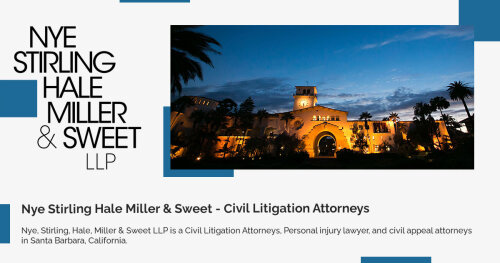Best Assault & Battery Lawyers in Santa Barbara
Share your needs with us, get contacted by law firms.
Free. Takes 2 min.
List of the best lawyers in Santa Barbara, United States
About Assault & Battery Law in Santa Barbara, United States:
Assault and battery are separate legal concepts but are often associated with each other. Assault occurs when someone threatens to harm another person, while battery involves the actual physical contact that causes harm. In Santa Barbara, California, the laws regarding assault and battery are taken seriously, and those found guilty can face severe penalties.
Why You May Need a Lawyer:
If you have been accused of assault or battery in Santa Barbara, it is crucial to have legal representation. A lawyer specializing in criminal defense can help protect your rights, navigate the legal system, and potentially reduce the charges or penalties you may face. Additionally, if you are a victim of assault or battery, a lawyer can assist you in seeking justice and compensation for your injuries.
Local Laws Overview:
In Santa Barbara, assault is typically charged as a misdemeanor, punishable by up to six months in jail and/or a fine of up to $1,000. Battery can be charged as a misdemeanor or felony, depending on the circumstances and severity of the offense. Penalties for battery can range from fines to several years in prison.
Frequently Asked Questions:
What is the difference between assault and battery?
Assault is the threat of harm, while battery is the actual physical contact that causes harm.
What should I do if I am charged with assault or battery?
It is essential to contact a criminal defense lawyer immediately to start building your defense and protect your rights.
Can I be charged with assault if I did not physically harm anyone?
Yes, threatening someone with harm can be considered assault under the law.
How can I prove that I acted in self-defense in a battery case?
You must demonstrate that you reasonably believed your actions were necessary to defend yourself from harm.
What are the potential defenses against assault and battery charges?
Self-defense, defense of others, lack of intent, and consent are common defenses in assault and battery cases.
Can I sue for damages if I am a victim of assault or battery?
Yes, you may be able to file a civil lawsuit for compensation for medical expenses, lost wages, pain and suffering, and other damages.
What if the alleged victim wants to drop the charges?
Even if the victim wants to drop the charges, the prosecutor may still pursue the case. It is crucial to seek legal advice in these situations.
How long do I have to file a civil lawsuit for assault or battery?
In California, the statute of limitations for filing a civil lawsuit for assault or battery is typically two years from the date of the incident.
Can I be charged with assault and battery for defending myself in a fight?
If you can prove that your actions were reasonable and necessary for self-defense, you may have a valid defense against assault and battery charges.
What factors can enhance the penalties for assault or battery charges?
Aggravating factors such as the use of a weapon, prior criminal history, or the victim's age or status can increase the severity of assault or battery charges.
Additional Resources:
If you need legal assistance with assault and battery cases in Santa Barbara, you may contact the Santa Barbara County Bar Association or the Public Defender's Office for resources and referrals to experienced criminal defense lawyers.
Next Steps:
If you are facing assault or battery charges in Santa Barbara, it is essential to seek legal advice immediately. Contact a criminal defense lawyer to discuss your case, understand your rights, and receive guidance on the best course of action to protect your interests.
Lawzana helps you find the best lawyers and law firms in Santa Barbara through a curated and pre-screened list of qualified legal professionals. Our platform offers rankings and detailed profiles of attorneys and law firms, allowing you to compare based on practice areas, including Assault & Battery, experience, and client feedback.
Each profile includes a description of the firm's areas of practice, client reviews, team members and partners, year of establishment, spoken languages, office locations, contact information, social media presence, and any published articles or resources. Most firms on our platform speak English and are experienced in both local and international legal matters.
Get a quote from top-rated law firms in Santa Barbara, United States — quickly, securely, and without unnecessary hassle.
Disclaimer:
The information provided on this page is for general informational purposes only and does not constitute legal advice. While we strive to ensure the accuracy and relevance of the content, legal information may change over time, and interpretations of the law can vary. You should always consult with a qualified legal professional for advice specific to your situation.
We disclaim all liability for actions taken or not taken based on the content of this page. If you believe any information is incorrect or outdated, please contact us, and we will review and update it where appropriate.








